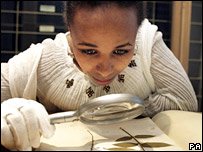Africa given free journal access
 Last Updated: Wednesday, 1 March 2006, 15:09 GMT
Last Updated: Wednesday, 1 March 2006, 15:09 GMTHareg Tadesse has called for other chemistry journals to open access
The Royal Society of Chemistry (RSC) has announced that it will give Africa free access to its journal archives.
A total of 1.5 million pages and 250,000 articles will be available electronically to African scientists.
At the launch of the initiative, an Ethiopian researcher called on other chemistry journals to open their archives free-of-charge, too.
Hareg Tadesse said: "It is not about only me, and only Africa - the whole of the developing world needs supporting."
The Archives for Africa scheme was launched on Tuesday at the House of Commons.
G8 push
"Access to scientific information is an essential ingredient for the establishment of a sustainable science base," said Dr Simon Campbell, the president of the RSC.
"We believe that free access to the RSC Archive will make a major contribution towards building scientific capacity, which African leaders have stated is essential for social and economic development."
The decision to open access to the journals followed the recent G8 meeting in Gleneagles, Scotland, which highlighted the need for capacity building in developing countries in science and technology.
Hareg Tadesse, a chemist from Ethiopia, who attended the launch, believes her research has benefited from access to the journals.
"In order to do my work, I needed to know the results from previous research. And it was really hard in Addis for me to get hold of the right papers. This is where the archives are going to be so useful," she explained.
Plant clues
Tadesse is carrying out research on a plant called Brucea antidysenterica found in Ethiopia.
Its medicinal properties were highlighted after the British explorer, James Bruce, was cured of dysentery after being given an extract of the plant when he was travelling in Ethiopia in the mid-18th Century.
Tadesse and others are now looking at the plant's compounds, some of which show medicinal and anti-cancer properties.
However, to aid African research, she said more scientific journals needed to give free access to their papers.
"I would like to call on all publishers of chemistry journals to follow the lead of the RSC to support young chemists like me with their archives so that we can bring the benefits of chemistry to our great continent," she added.
http://news.bbc.co.uk/1/hi/sci/tech/4760074.stm

0 Comments:
Post a Comment
<< Home